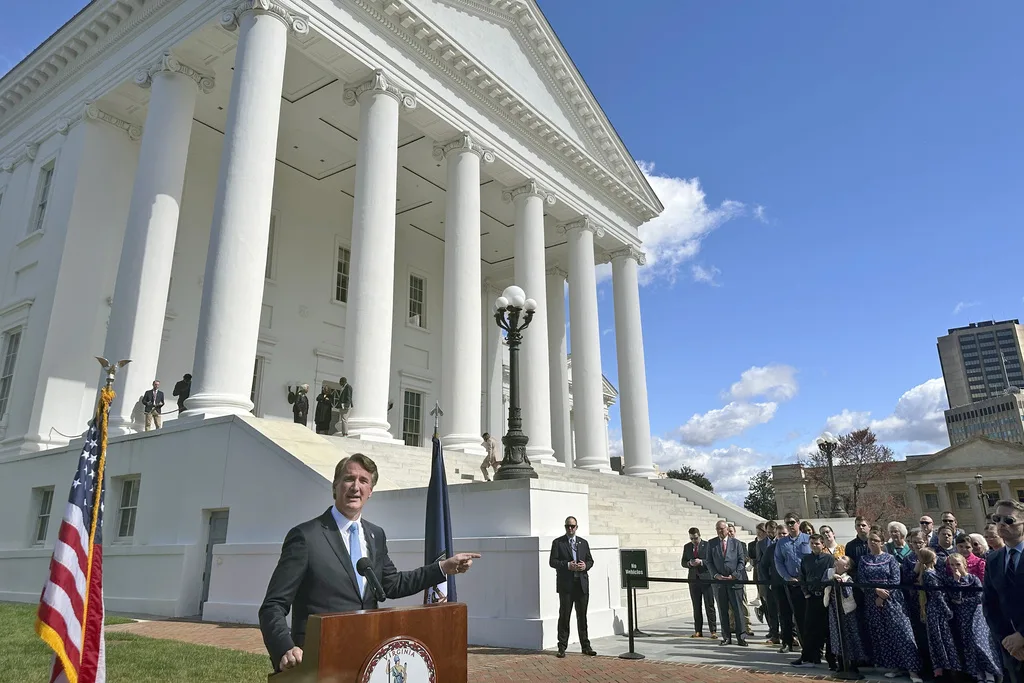
Photo via Michael Feggans for Virginia
Del. Michael Feggans views himself as a man of his word—and he’s proven that during his first-ever General Assembly session on the House of Delegates floor.
“A lot of the bills that we did introduce were focused on the issues that we really ran on,” Feggans said. “We really focused on education, veterans, small business, housing, cybersecurity, innovation, and flooding resilience.”
The bills he helped introduce focused by and large by helping Virginians’ pocketbooks. But one bill on housing aimed to solve an ever-present concern for renters: Your landlord and a maintenance crew unexpectedly coming through your door one day.
Fair practices between tenants and landlords were Feggan’s priority with HB 701, which calls for adding a maximum of 14 days for routine maintenance to the Residential Landlord Act.
“Before, if someone—a landlord or maintenance crew—sent you an email or message, they were required a minimum of three days [to address the issue], but there wasn’t a maximum. So they could send an email or message months in advance, and then that would actually suffice. It creates an instance, and it happened to where [a] maintenance crew could walk in, and the renter didn’t remember months in advance that they sent” for a repair, Feggans said. “This sets the timeline between three days at minimum and 14 days maximum.”
The delegate said that the change could add some reassurance for both renters and landlords when it came to privacy and similar issues.
Another, HB 327, also had a special story. It was the delegate’s first constituent-driven bill.
“It was a bill that was brought to us by individuals from the disability community to help look at ways to help the community in terms of rental assistance,” he said. “I’m proud of that bill because what we were able to do is actually get some of the language in there about inclusive housing into the code. So hopefully the governor will sign that. It shows Virginia’s commitment to making sure that all individuals are able to have inclusive housing.”
One piece of legislation, House Bill (HB) 651, became a full-circle moment. The delegate called the legislation pertaining to a cyber civilian corps his “passion bill.”
“That’s the bill that I created almost seven or eight years ago when I was interning for Gov. [Terry] McAuliffe’s administration as a cybersecurity intern,” Feggans said. “[I] crafted an idea on creating a cyber civilian corps. And so I always had it in my back pocket if I ever ran for office one day.”
Aiming to help small businesses deal with cybersecurity issues, the legislation would assess the creation and utility of a volunteer group of technical experts. While Virginia’s program would be in its infancy, we looked for similar programs across the county. Michigan, for example, has an established cyber civilian corps equipped to “provide rapid response assistance” in the event of a cyber incident, according to the state’s Department of Technology, Management & Budget.
HB 651 passed both the House and state Senate. It currently awaits a signature from Gov. Glenn Youngkin before becoming law.
“To be able to draft that, and to have an idea—and to hold onto the idea for years and years and to be able to actually see, now, that it’s headed towards the governor’s desk—is a really fulfilling moment,” Feggans said. “I’ve always been a dreamer, and so to be able to continue to follow my dreams and to be able to represent the city of Virginia Beach and have a bill idea that I came up with a long time ago as an intern is a fulfilling moment.”
HB 673 is also on its way to Youngkin’s desk. The bill calls for the Department of Conservation to give some additional preference to using grants and loans for projects in low-income neighborhoods in the state.
Small business manufacturers could see some positive changes coming their way thanks to HB 1361 and the Virginia Public Procurement Act. The legislation gives preference to businesses and people that produce materials in Virginia when it comes to certain bidding contracts with government agencies. That bill passed both chambers and now awaits a signature from Youngkin.
“That was one of our more signature bills that is really going to be able to help make sure that Virginia is able to compete, especially along with some of the other southern states who have resident manufacturer preferences,” Feggans said.
HB 374 also awaits a signature. It would establish a Virginia Minority Business Commission. The 13-member group would work to promote the growth and competitiveness of Virginia minority-owned businesses.
Overall, six out of the 11 bills that Feggans introduced this session made it across the finish line.
Politics

Biden administration bans noncompete clauses for workers
The Federal Trade Commission (FTC) voted on Tuesday to ban noncompete agreements—those pesky clauses that employers often force their workers to...

Democratic shakeup in Virginia primaries for governor, lieutenant governor
Richmond Mayor Levar Stoney quit his bid for governor and jumped into the race to be the Democratic nominee for lieutenant governor. The race for...
Local News

The zodiac signs of 12 iconic women offer insight into their historic accomplishments
Zodiac signs can tell you a lot about someone’s personality. Whether they’re an earth, water, air, or fire sign, these 12 categories (which are...

Virginia verses: Celebrating 5 poetic icons for National Poetry Month
There’s no shortage of great writers when it comes to our commonwealth. From the haunting verses of Edgar Allan Poe, who found solace in Richmond's...





